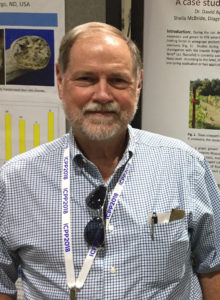Texas A&M’s Appel receives Outstanding Plant Pathologist honors
Southern Division of the American Phytopathological Society provides award
In recognition of his distinguished contributions to plant pathology, the Southern Division of the American Phytopathological Society has honored David Appel, Ph.D., with its Outstanding Plant Pathologist award.

Appel is a professor and Texas A&M AgriLife Extension Service specialist with the Texas A&M University College of Agriculture and Life Sciences Department of Plant Pathology and Microbiology. He specializes in forest and shade tree pathology, wine grape diseases and plant disease control.
“Throughout his career, Dr. Appel has maintained a research program focused on some of the most resistant plant diseases and invasive species in Texas and disseminated the results to stakeholders,” said Kevin Ong, Ph.D., professor and associate department head for AgriLife Extension with the Department of Plant Pathology and Microbiology. “As a result, he has ensured that Texas A&M is a premiere source of research-based information on a wide variety of diseases so Texans can grow healthy and productive trees and plants.”
Appel earned his bachelor’s and master’s degrees in plant pathology from West Virginia University and his doctorate in plant pathology from Virginia Tech.
Oak wilt disease
Appel diagnosed oak wilt as the cause of a highly destructive oak mortality epidemic in Texas. He developed an integrated management program for disease control that has become standard practice for natural resource management.
His collaboration with the U.S. Forest Service, USFS, and the Texas A&M Forest Service, Texas A&M Forest Service, produced a USFS-sponsored pest suppression project to provide landowner assistance in implementing oak wilt controls. His testing on using propiconazole for intravascular injection led to a new label for the fungicide Alamo that was adopted throughout the U.S. to control oak wilt. It is also a standard recommendation for other diseases such as Dutch elm disease and laurel wilt.
Appel’s work advanced understanding of where the oak wilt pathogen may have originated and how the disease affects the breeding and feeding behaviors of the golden-cheeked warbler, an endangered species in Central Texas.
His long-term partnerships with the USFS, the Texas A&M Forest Service, the Texas Department of Agriculture, the Texas Chapter of the International Society of Arboriculture and ranchers and homeowners optimized his research. In 1992, Gov. Ann Richards recognized the results of these cooperative efforts when she declared the third week of June as Oak Wilt Awareness Week in Texas.
Wine grape diseases
Appel used a similar approach for grape diseases. Twenty years ago, Pierce’s disease, PD, threatened the rapidly growing wine grape industry in Texas. Appel analyzed the pathogen spread patterns and the population structure of the grape strain of X. fastidiosa within vineyards. His research showed the need to aggressively manage the insect vector and reduce inoculum sources to decrease PD losses. His comprehensive demonstration and educational efforts have significantly reduced PD in Texas, despite the increasing use of the highly desirable but susceptible Viniferacultivars.
Appel also studied cotton root rot, CRR, disease on wine grapes. His research led to a label for the fungicide Topguard Terra, giving Texas wine grape growers the only option for dealing with CRR.
Current projects include grapevine trunk diseases and identification of viruses that affect wine grapes, conducting his research in cooperative efforts with Texas vineyard managers and owners. His recent work with grapes contributed to publications of novel grape viruses in 2019 and 2020.
Invasive pathogens
Another emphasis of Appel’s work is exotic, invasive pathogens. One of the most threatening involved the introduction of giant Asian (Japanese) dodder, GAD, in Houston. He participated in a team of federal, state and municipal agencies to survey and eradicate the pathogen before the problem became untenable.
Appel also leads efforts to survey and monitor sudden oak death. This pathogen has been detected in several Texas nurseries as well as in streams at two locations in the state.
He also contributed to the citrus health response program to survey and monitor citrus greening and citrus canker on the Texas Upper Gulf Coast.
Education, outreach and leadership
As an AgriLife Extension specialist, Appel has participated in over 1,000 homeowner meetings, workshops, Master Gardener trainings and county programs to extend his research to the public, professional arborists, landscape specialists and Texas wine grape growers.
Appel has taught plant pathology to thousands of graduate and undergraduate students for over 30 years. He served the Department of Plant Pathology and Microbiology as interim department head, associate department head for academics and associate department head and program leader for AgriLife Extension. He also served as interim department head for forest science, which is now the Department of Ecology and Conservation Biology.
He was recognized by the Texas Chapter of the International Society of Arboriculture as Outstanding Professional of the Year in 2004.
Appel said that this award is among the most meaningful given by the professional society. “The Southern Division of the American Phytopathological Society has a strong history of providing excellence in research and applied solutions for grower’s problems.” Appel said. “I want to thank them and my colleagues for supporting my efforts throughout my career and honoring me with this distinction.”


